ESP CADILLAC DEVILLE 1993 7.G Owner's Manual
[x] Cancel search | Manufacturer: CADILLAC, Model Year: 1993, Model line: DEVILLE, Model: CADILLAC DEVILLE 1993 7.GPages: 406, PDF Size: 20.78 MB
Page 275 of 406
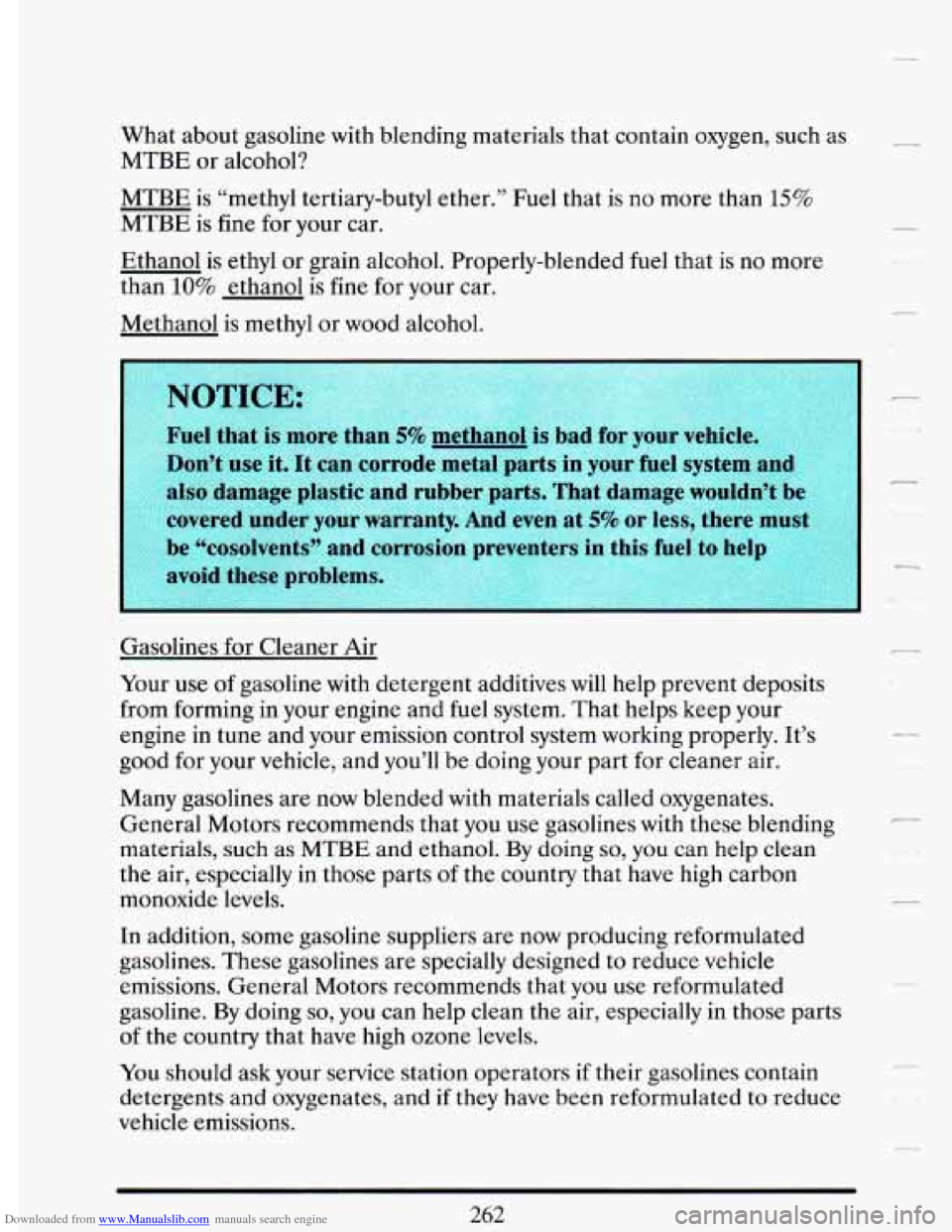
Downloaded from www.Manualslib.com manuals search engine What about gasoline with blending materials that contain oxygen, such as
MTBE or alcohol?
MTBE is “methyl tertiary-butyl ether.” Fuel that is
no more than 15%
MTBE is fine for your car.
Ethanol is ethyl or grain alcohol. Properly-blended fuel that is no more
than
10% ethanol is fine for your car.
Methanol is methyl or wood alcohol.
Gasolines for Cleaner
Air
Your use of gasoline with detergent additives will help prevent deposits
from forming in your engine and fuel system. That helps keep
your
engine in tune and your emission control system working properly. It’s
good for your vehicle, and you’ll be doing your part for cleaner air.
Many gasolines are
now blended with materials called oxygenates.
General Motors recommends that you use gasolines with these blending
materials, such as
MTBE and ethanol. By doing so, you can help clean
the air, especially in those parts of the country that have high carbon
monoxide levels.
In addition, some gasoline suppliers are now producing reformulated
gasolines. These gasolines are specially designed to reduce vehicle
emissions. General Motors recommends that you use reformulated
gasoline.
By doing so, you can help clean the air, especially in those parts
of the country that have high ozone levels.
You should ask your service station operators if their gasolines contain
detergents and oxygenates, and if they have been reformulated to reduce
vehicle emissions.
r
L
.-.
262
Page 288 of 406
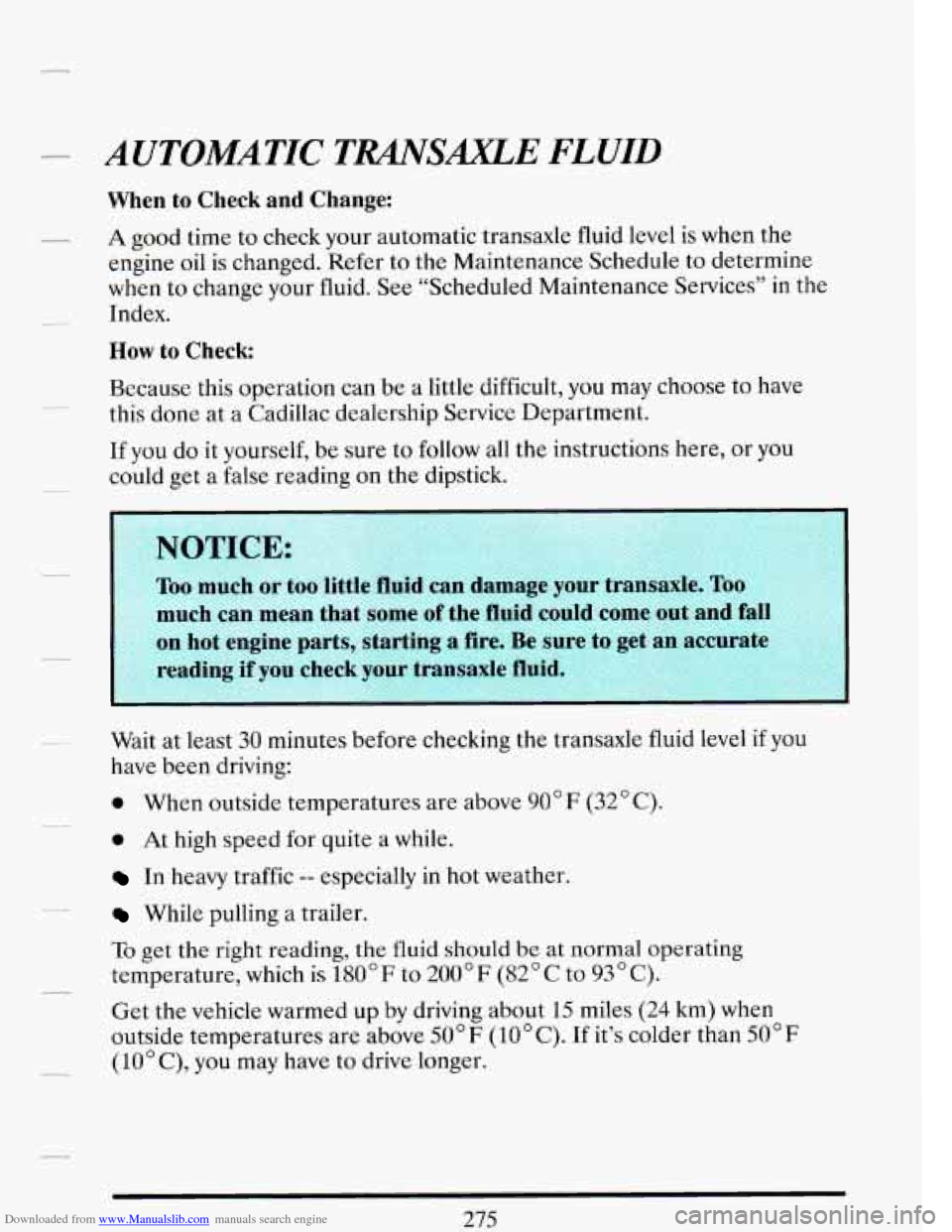
Downloaded from www.Manualslib.com manuals search engine AUTOMATIC TRAS.E FLUID
When to Check and Change:
A good time to check your automatic transaxle fluid level is when the
engine oil is changed. Refer to the Maintenance Schedule to determine
when to change your fluid. See "Scheduled Maintenance Services"
in the
Index.
How to Check
Because this operation can be a little difficult, you may choose to have
this done
at a Cadillac dealership Service Department.
If you do it yourself, be sure to follow all the instructions here, or you
could get a false reading on the dipstick.
Wait at least
30 minutes before checking the transaxle fluid level if you
have been driving:
0 When outside temperatures are above 90" F (32°C).
0 At high speed for quite a while.
In heavy traffic -- especially in hot weather.
While pulling a trailer.
To get the right reading, the fluid should be at normal operating
temperature, which is
180°F to 200" F (82 " C to 93 " C).
Get the vehicle warmed up by driving about 15 miles (24 km) when
outside temperatures are above
50°F (10°C). If it's colder than 50°F
(10" C), you may have to drive longer.
275
Page 290 of 406
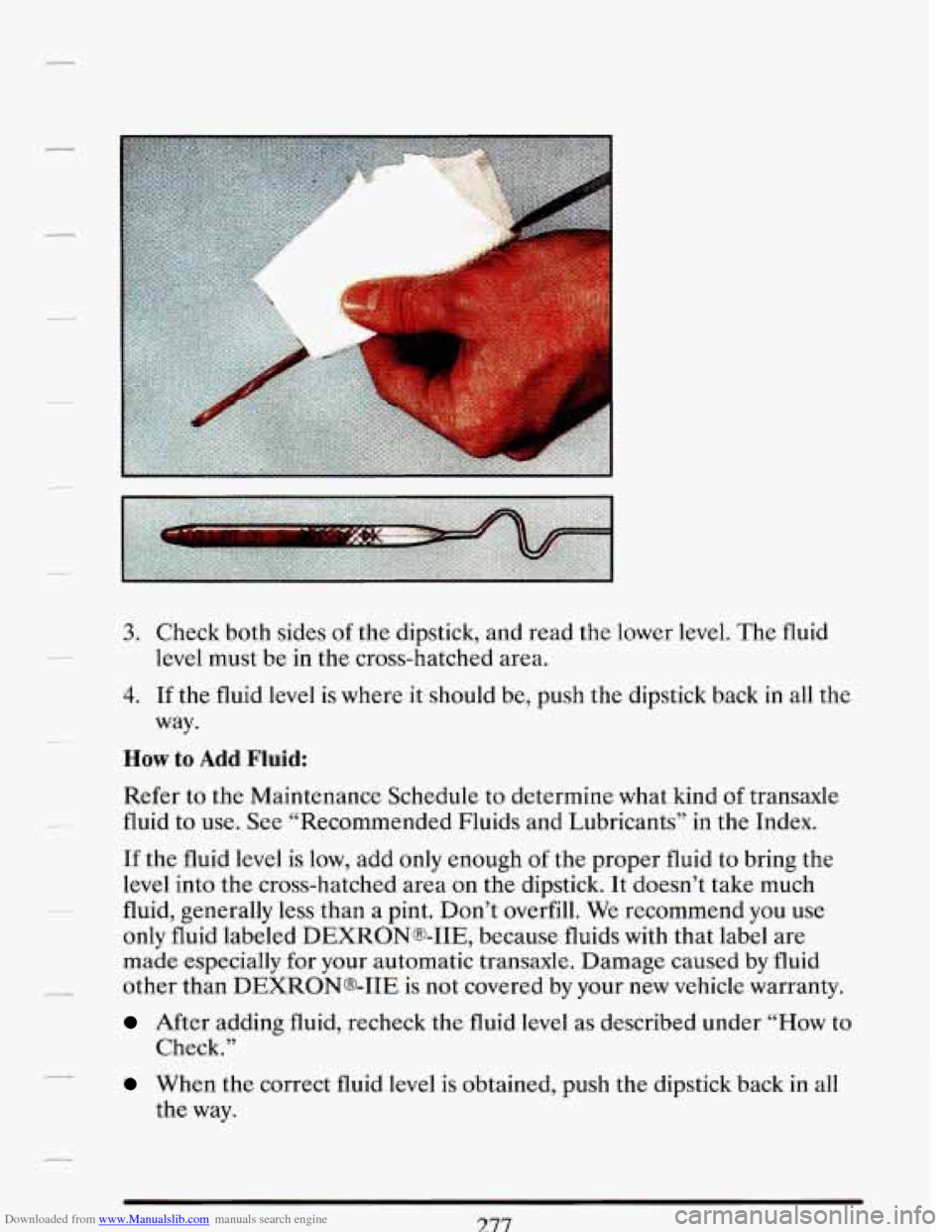
Downloaded from www.Manualslib.com manuals search engine 3. Check both sides of the dipstick, and read the lower level. The fluid
level must be in the cross-hatched area.
4. If the fluid level is where it should be, push the dipstick back in all the
How to Add Fluid:
way.
Refer to the Maintenance Schedule to determine what kind
of transaxle
fluid to use.
See “Recommended Fluids and Lubricants” in the Index.
If the fluid level is low, add only enough of the proper fluid to bring the
level into the cross-hatched area on the dipstick. It doesn’t take much
fluid, generally less than a pint. Don’t overfill. We recommend you use
only fluid labeled
DEXRONWIE, because fluids with that label are
made especially for your automatic transaxle. Damage caused
by fluid
other than DEXRONWIE is not covered by your new vehicle warranty.
After adding fluid, recheck the fluid level as described under “How to
Check.”
When the correct fluid level is obtained, push the dipstick back in all
the way.
Page 321 of 406
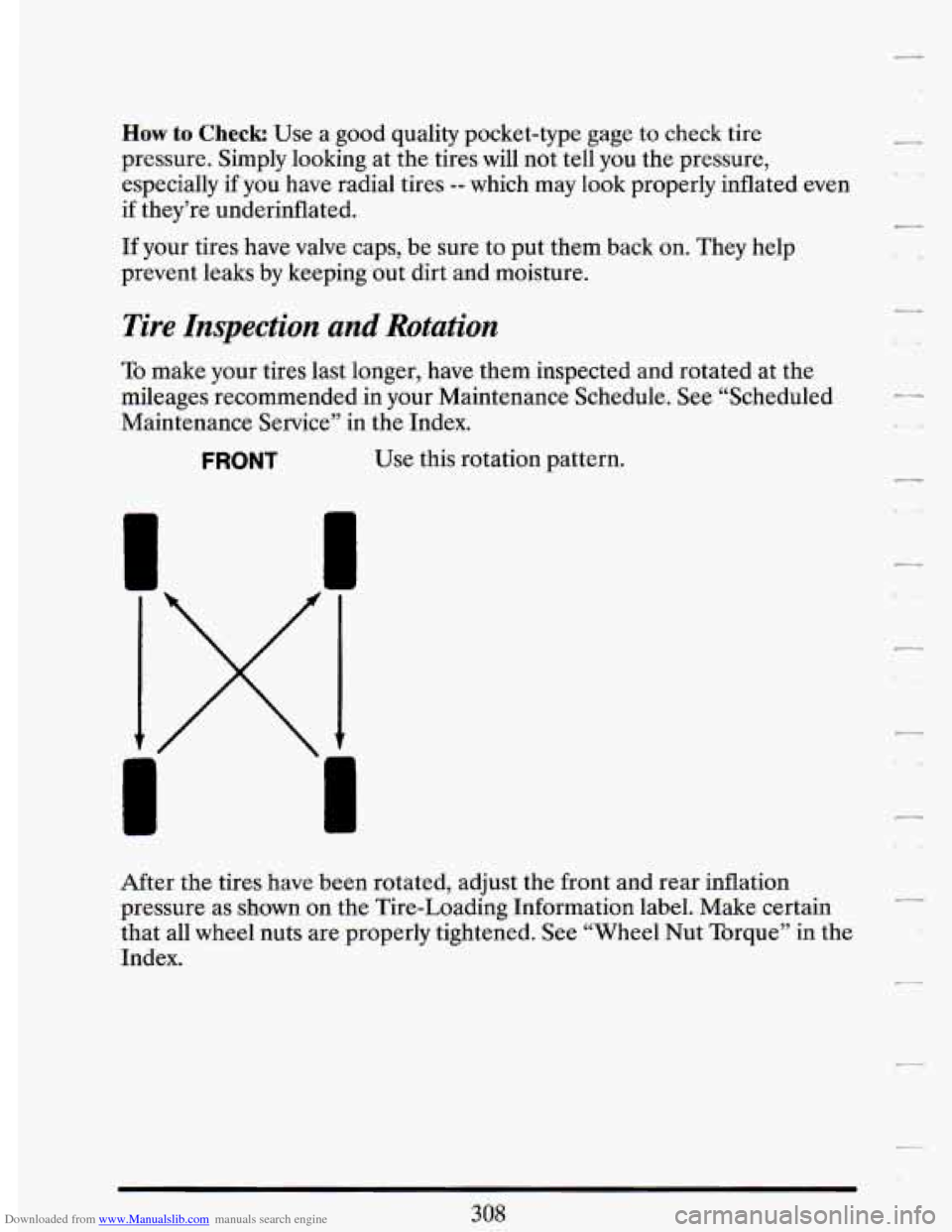
Downloaded from www.Manualslib.com manuals search engine How to Check Use a good quality pocket-type gage to check tire
pressure. Simply looking at the tires will not tell you the pressure,
especially if you have radial tires
-- which may look properly inflated even
if they’re underinflated.
If your tires have valve caps, be sure to put them back on. They help
prevent leaks by keeping out dirt and moisture.
Tire Inspection and Rotation
To make your tires last longer, have them inspected and rotated at the
mileages recommended in your Maintenance Schedule. See “Scheduled Maintenance Service” in the Index.
FRONT Use this rotation pattern.
After the tires have been rotated, adjust the front and rear inflation
pressure as shown on the Tire-Loading Information label. Make certain
that all wheel nuts are properly tightened.
See “Wheel Nut Torque” in the
Index.
Page 324 of 406
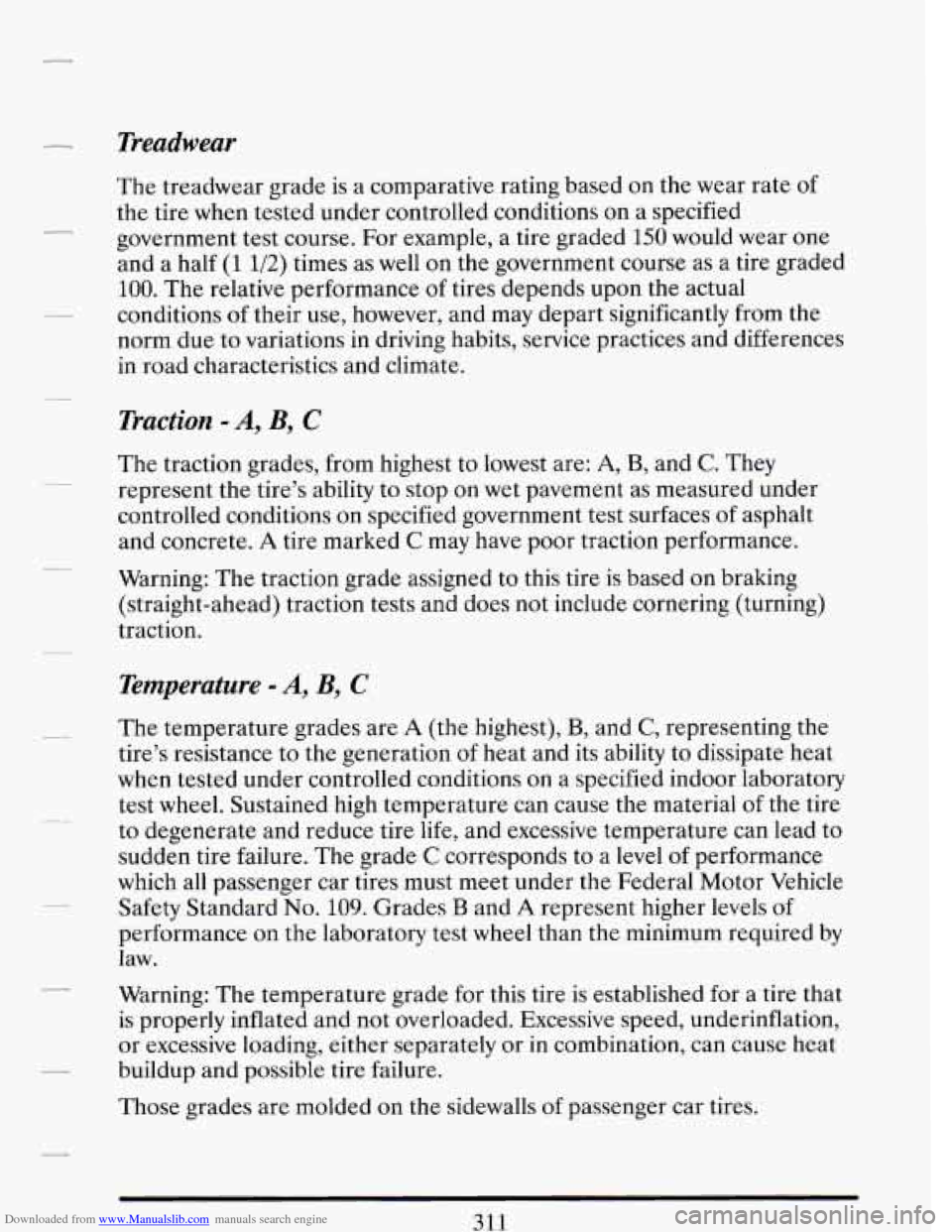
Downloaded from www.Manualslib.com manuals search engine Treadwear
The treadwear grade is a comparative rating based on the wear rate of
the tire when tested under controlled conditions on a specified
government test course. For example, a tire graded
150 would wear one
and a half
(1 112) times as well on the government course as a tire graded
100. The relative performance of tires depends upon the actual
conditions
of their use, however, and may depart significantly from the
norm due to variations in driving habits, service practices and differences
in road characteristics and climate.
Traction - A, B, C
The traction grades, from highest to lowest are: A, B, and C. They
represent the tire’s ability to stop on wet pavement as measured under
controlled conditions on specified government test surfaces
of asphalt
and concrete.
A tire marked C may have poor traction performance.
Warning: The traction grade assigned to this tire
is based on braking
(straight-ahead) traction tests and does not include cornering (turning)
traction.
Temperature - A, B, C
The temperature grades are A (the highest), B, and C, representing the
tire’s resistance to the generation
of heat and its ability to dissipate heat
when tested under controlled conditions on a specified indoor laboratory
test wheel. Sustained high temperature can cause the material of the tire
to degenerate and reduce tire life, and excessive temperature can lead to
sudden tire failure.
The grade C corresponds to a level of performance
which all passenger car tires must meet under the Federal Motor Vehicle
Safety Standard
No. 109. Grades B and A represent higher levels of
performance on the laboratory test wheel than the minimum required by
law.
Warning:
The temperature grade for this tire is established for a tire that
is properly inflated and not overloaded. Excessive speed, underinflation,
or excessive loading, either separately or in combination, can cause heat
buildup and possible tire failure.
Those grades are molded on the sidewalls
of passenger car tires.
311
Page 325 of 406
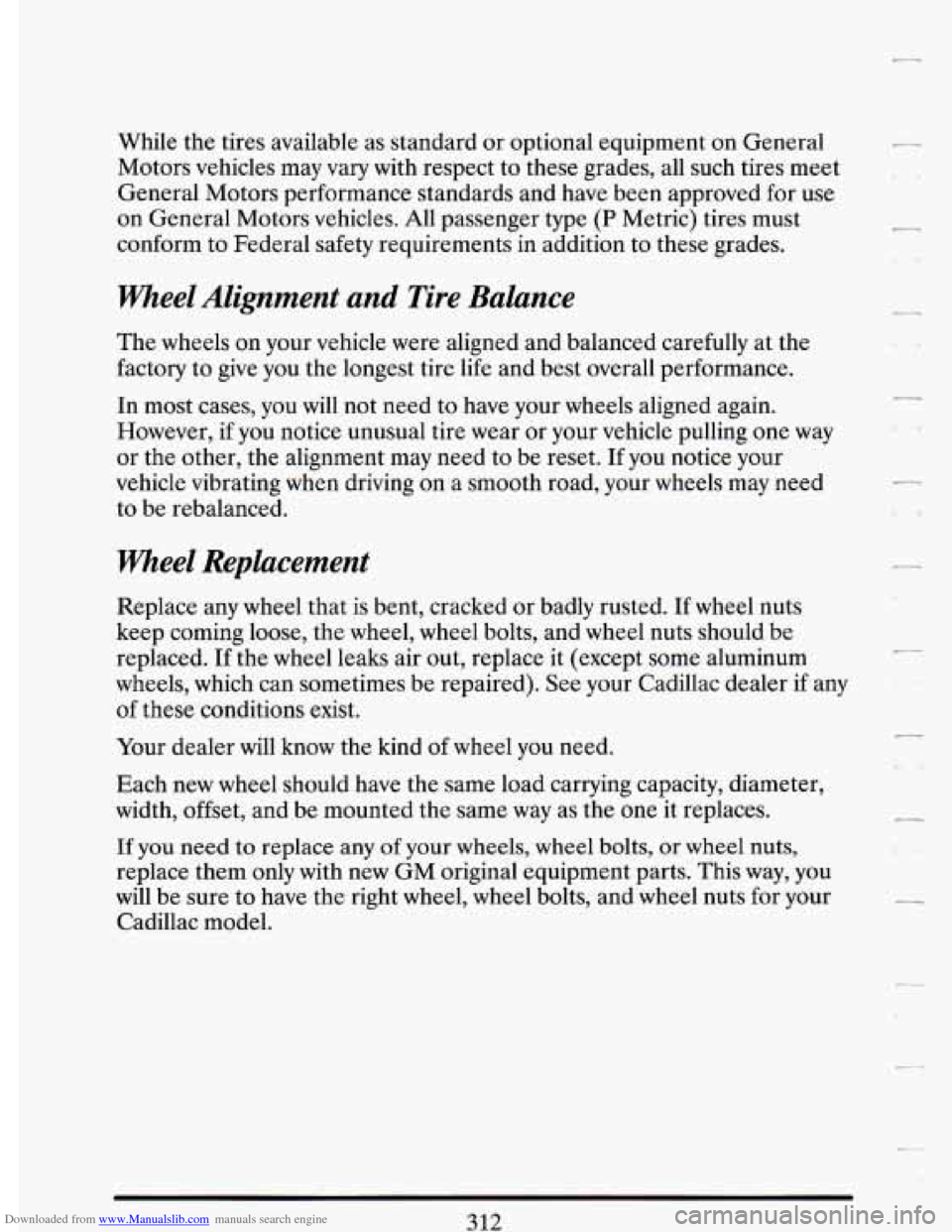
Downloaded from www.Manualslib.com manuals search engine While the tires available as standard or optional equipment on General
Motors vehicles may vary with respect to these grades, all such tires meet
General Motors performance standards and have been approved for use
on General Motors vehicles. All passenger type
(P Metric) tires must
conform
to Federal safety requirements in addition to these grades.
Wheel Alignment and Tire Balance
The wheels on your vehicle were aligned and balanced carefully at the
factory to give you the longest
tire life and best overall performance.
In most cases, you will not need to have your wheels aligned again.
However, if you notice unusual tire wear or your vehicle pulling one way
or the other, the alignment may need to be reset.
If you notice your
vehicle vibrating when driving on a smooth road, your wheels may need
to be rebalanced.
Meel Replacement
Replace any wheel that is bent, cracked or badly rusted. If wheel nuts
keep coming loose, the wheel, wheel bolts, and wheel nuts should be
replaced. If the wheel leaks air out, replace it (except some aluminum
wheels, which can sometimes be repaired). See your Cadillac dealer
if any
of these conditions exist.
Your dealer
will know the kind of wheel you need.
Each new wheel should have
the same load carrying capacity, diameter,
width, offset, and be mounted the same way as the one
it replaces.
If you need to replace any of your wheels, wheel bolts, or wheel nuts,
replace them only with new GM original equipment parts. This way, you
will be sure to have the riqht wheel, wheel bolts, and wheel nuts for your
Cadillac model.
312
Page 369 of 406
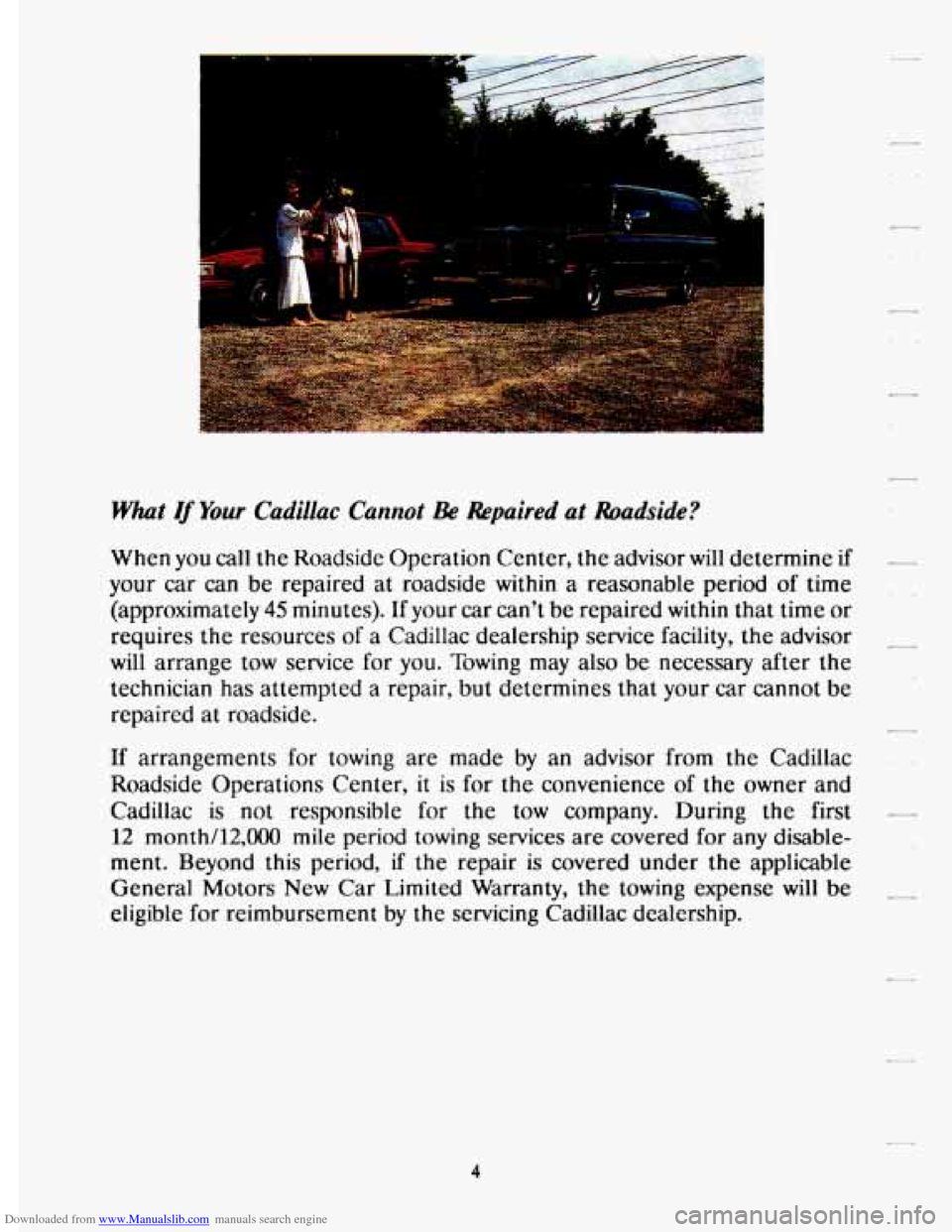
Downloaded from www.Manualslib.com manuals search engine What If Your Cadillac Cannot Be Repaired at Roadside?
When you call the Roadside Operation Center, the advisor will determine if
your car can be repaired at roadside within a reasonable period of time
(approximately 45 minutes). If your car can't be repaired within that time or
requires the resources
of a Cadillac dealership service facility, the advisor
will arrange tow service for you. Towing may also be necessary after
the
technician has attempted a repair, but determines that your car cannot be
repaired at roadside.
If arrangements for towing are made by an advisor from
the Cadillac
Roadside Operations Center,
it is for the convenience of the owner and
Cadillac is not responsible for the tow company. During the first
12 month/12,000 mile period towing services are covered for any disable-
ment. Beyond this period, if the repair is covered under the applicable
General Motors
New Car Limited Warranty, the towing expense will be
eligible
for reimbursement by the servicing Cadillac dealership.
4
Page 373 of 406
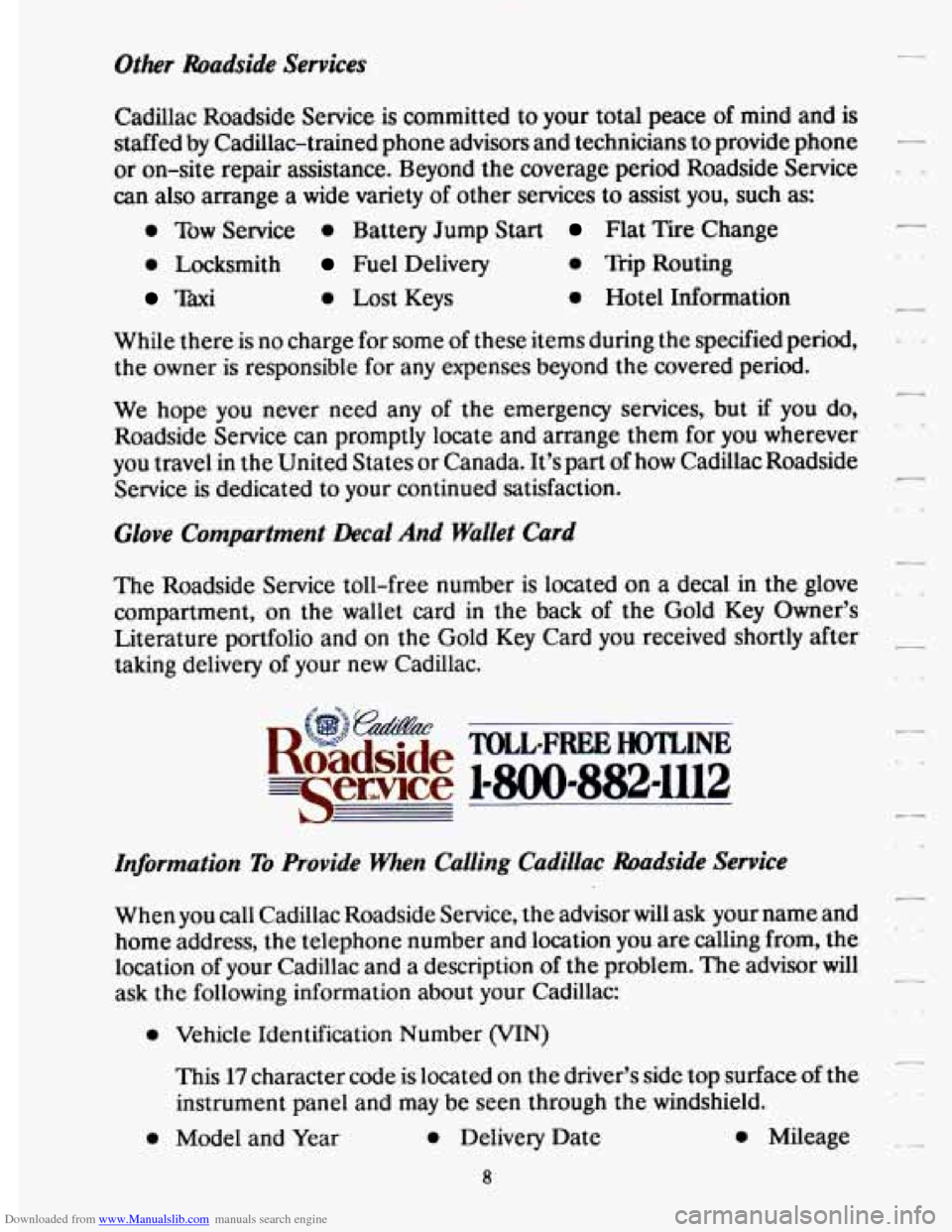
Downloaded from www.Manualslib.com manuals search engine Other Roadside Services
Cadillac Roadside Service is committed to your total peace of mind and is
staffed by Cadillac-trained phone advisors and technicians to provide phone
or on-site repair assistance. Beyond the coverage period Roadside Service
can also arrange a wide variety of other services to assist YOU, such as:
0 TOW Service 0 Battery Jump Start Flat Tire Change
0 Locksmith Fuel Delivery 0 Trip Routing
Tmxi 0 Lost Keys 0 Hotel Information
While there is no charge for some of these items during the specified period,
the owner is responsible for any expenses beyond the covered period.
We hope you never need any of the emergency services, but
if you do,
Roadside Service
can promptly locate and arrange them for you wherever
you travel in the United States or Canada. It’s part
of how Cadillac Roadside
Service
is dedicated to your continued satisfaction.
Glove Compartment Decal And Wallet Card
The Roadside Service toll-free number is located on a decal in the glove
compartment, on the wallet card
in the back of the Gold Key Owner’s
Literature portfolio and on
the Gold Key Card you received shortly after
taking delivery
of your new Cadillac.
TOLL-FREE HOTLINE
Information To Provide When Calling Cadillac Roadside Service
When you call Cadillac Roadside Service, the advisor will ask your name and
home address, the telephone number and location you are calling from, the
location of your Cadillac and a description
of the problem. The advisor will
ask
the following information about your Cadillac:
0 Vehicle Identification Number WIN)
This
17 character code is located on the driver’s side top surface of the
instrument panel and may be seen through the windshield.
0 Model and Year 0 Delivery Date 0 Mileage
c.-
L1
8
Page 376 of 406
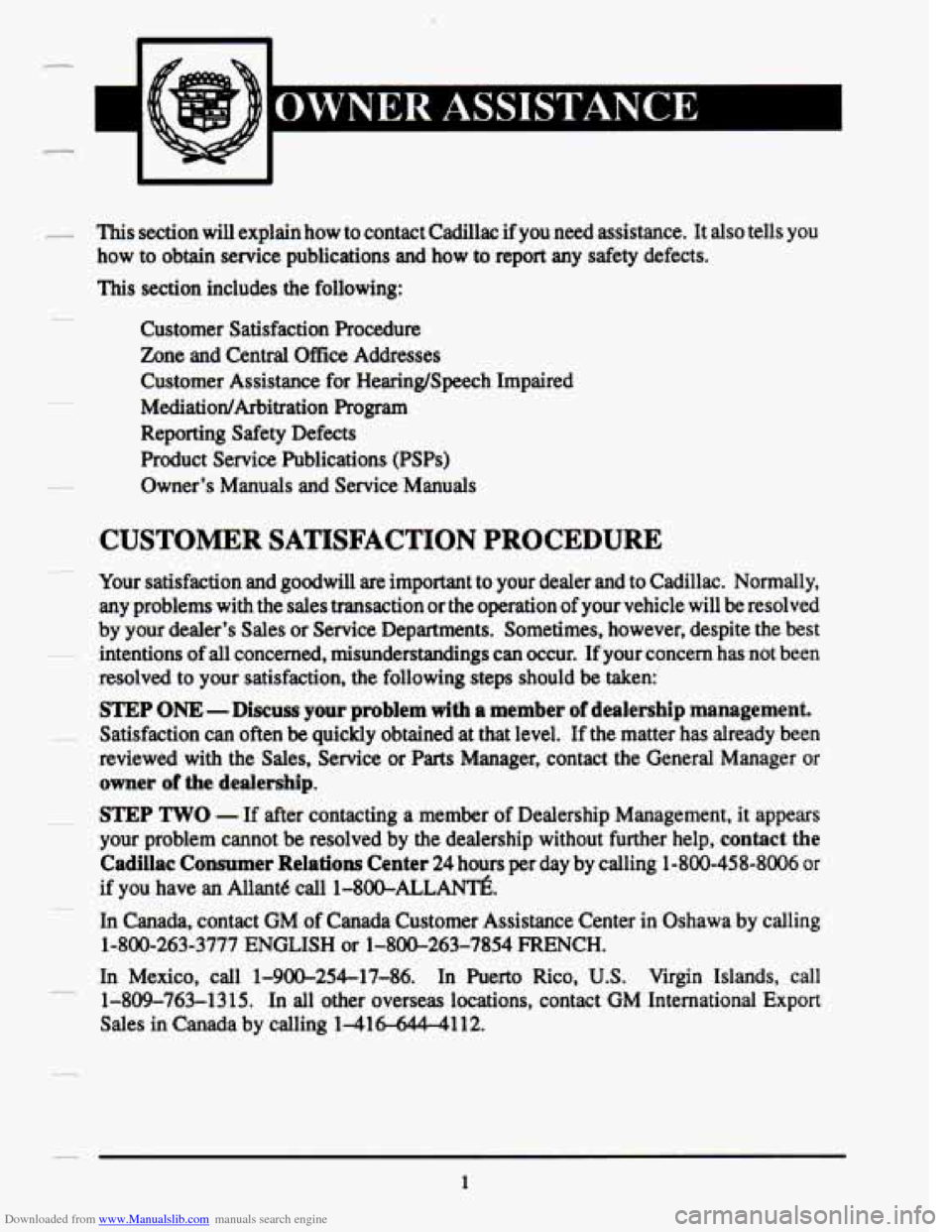
Downloaded from www.Manualslib.com manuals search engine I
OWNER ASSISTANCE
- This section will explain how to contact Cadillac if you need assistance. It also tells you
how to obtain service publications and how
to report any safety defects.
This section includes the following:
.- Customer Satisfaction Procedure
Zone and Central Office Addresses
Customer Assistance for Hearing/Speech Impaired
MediatiodArbitration
Program
Reporting Safety Defects
Product Service Publications
(PSPs)
Owner’s Manuals and Service Manuals
CUSTOMER SATISFACTION PROCEDURE
__ Your satisfaction and goodwill are important to your dealer and\
to Cadillac. Normally,
any problems with the sales transaction or the operation of your vehicle will be resolved
by your dealer’s Sales or Service Departments. Sometimes, how\
ever, despite the best
~~ intentions of all concerned, misunderstandings can occur. If you\
r concern has not been
resolved to your satisfaction, the following steps should
be taken:
STEP ONE - Discuss your problem with a member of dealership management.
Satisfaction can often be quickly obtained at that level. If the matter has already been
reviewed
with the Sales, Service or Parts Manager, contact the General Manage\
r or
owner of the dealership.
STEP TWO - If after contacting a member of Dealership Management, it appears
your problem cannot
be resolved by the dealership without further help, contact the
Cadillac Consumer Relations Center 24 hours per day by calling 1-800-458-8006 or
if you have an AllantC call 1-800-ALLANTk.
In Canada, contact
GM of Canada Customer Assistance Center in Oshawa by calling
1-800-263-3777 ENGLISH or 1-800-263-7854 FRENCH.
In Mexico, call 1-900-254-17-86. In Puerto Rico,
U.S. Virgin Islands, call
1-809-763-1315. In all other overseas locations, contact GM Inte\
rnational Export
Sales in Canada by calling 1-416-644-4112. -.
-
1
Page 377 of 406
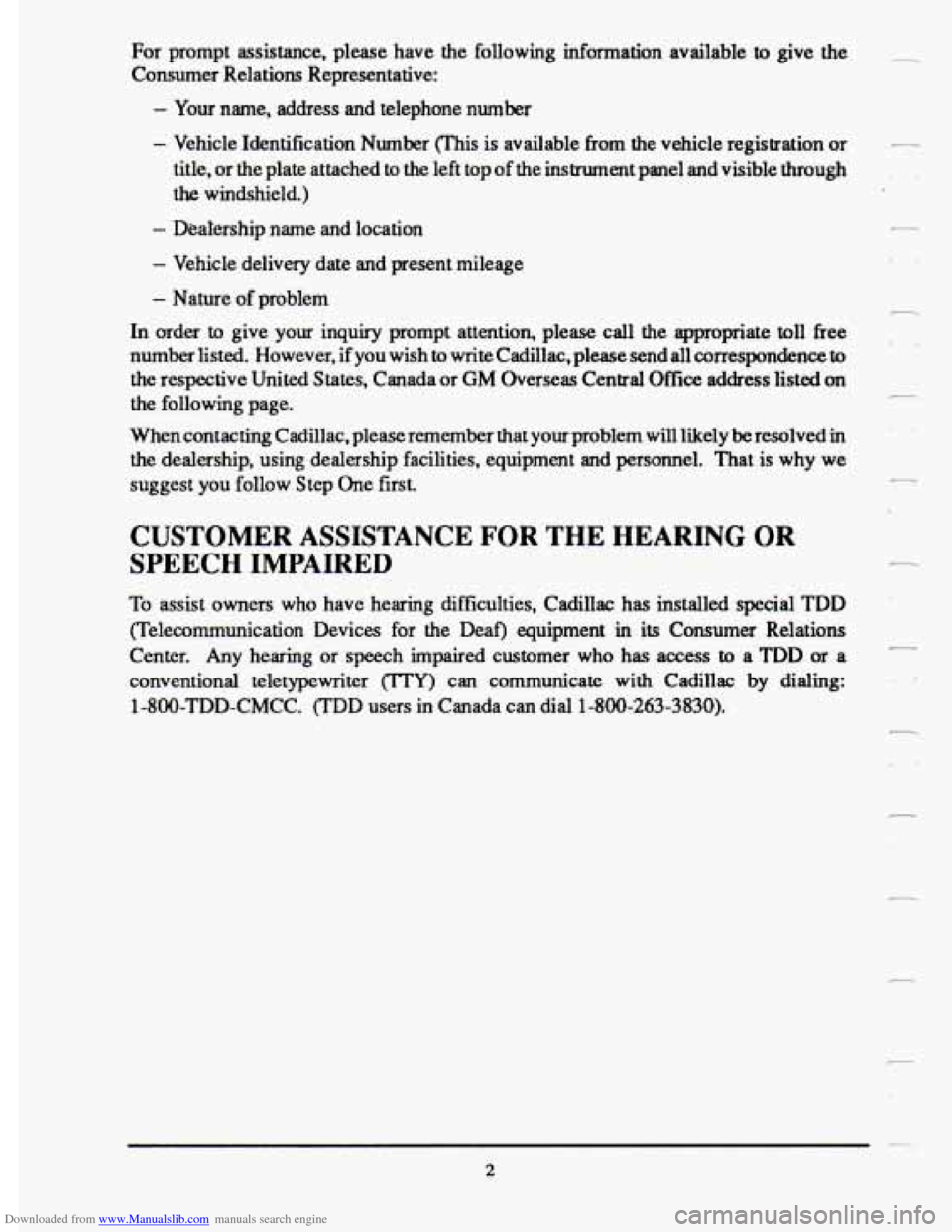
Downloaded from www.Manualslib.com manuals search engine For prompt assistance, please have the following information ava\
ilable to give the
Consumer Relations Representative:
- Your name, address and telephone number
- Vehicle Identification Number (This is available from the vehicle registration or
title, or the plate attached to the left top of the instrument panel and visible through
the windshield.)
- Dea€ership name and location
- Vehicle delivery date and present mileage
- Nature of problem
In order
to give your inquiry prompt attention, please call the appropriate toll fiee
number
listed. However, if you wish to write Cadillac, please send all correspondence to
the respective United States, Canada or GM Overseas Central Office address listed on
the following page.
When contacting Cadillac, please remember that
your problem will likely be resolved in
the dealership, using dealership facilities, equipment and person\
nel. That is
why we
suggest
you follow Step One first.
CUSTOMER ASSISTANCE FOR THE HEARING OR
SPEECH IMPAIRED
To assist owners who have hearing difficulties, Cadillac has instal\
led special TDD
(Telecommunication Devices for the Deaf) equipment in its Consumer Relations
Center. Any hearing or speech impaired customer who has access \
to a TDD or a
conventional teletypewriter my) can communicate with Cadillac by dialing:
1-800-TDD-CMCC.
(TDD users in Canada can dial 1-800-263-3830).
7
2